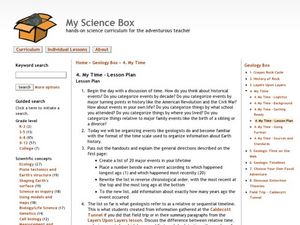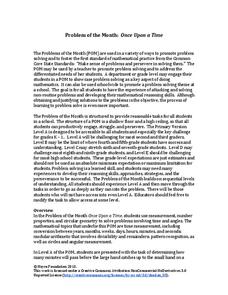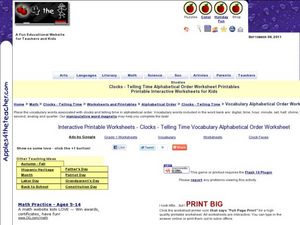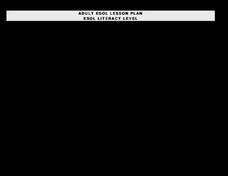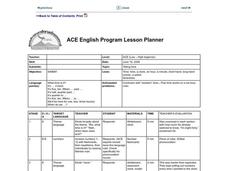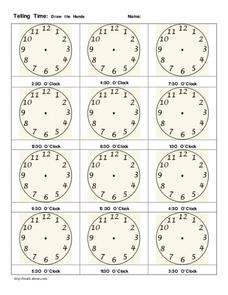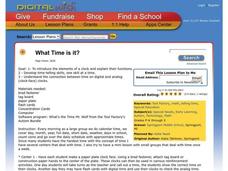Curated OER
Rates of Chemical Reactions-The Iodine Clock Reaction
Students investigate the reaction rate of iodine and soluble starch. In this rates of chemical reactions lesson plan, students study the effects of varying concentrations of reactants and varying temperatures of reactants on the reaction...
Curated OER
My Time!
Learners explore how to tell time by looking at their daily schedule. Everyone's days start out the same (with school), but what does each learner do after school? How do they spend their time?
Computer Science Unplugged
Beat the Clock—Sorting Networks
Can multiple computers sort a list faster than one? Using a network drawn with chalk outside, groups move through the decision network to sort numbers. A series of extension questions come with the lesson and can be used in the same...
Noyce Foundation
Once Upon a Time
Examine the relationship between time and geometry. A series of five lessons provides a grade-appropriate problem from elementary through high school. Each problem asks learners to compare the movement of the hands on a clock to an angle...
Curated OER
Time: All About Clocks-Alphabetical Order
In this clock worksheet, students alphabetize a set of words in a word box at the bottom of the page. Worksheet has links to additional activities.
Curated OER
The 24-Hour Clock #2
In this time instructional activity, students write a set of 15 given 24-hour clock times, using "am" or "pm." Answers are included on page 2.
Curated OER
What Time Is It?
Fourth graders distinguish between analog and digital clocks and read time from both types. In this clock reading lesson, 4th graders discuss the types of clocks and the time zones. Students find times in specific time zones. Students...
Curated OER
Time: How To Tell What Time It Is
Learners practice telling time using analog and digital clocks. In this time telling lesson, students read the book The Grouchy Ladybug by Eric Carle, and practice telling the time on a model clock that is constantly changing....
Curated OER
ESOL: Time and Money
Students study the parts of an analog and digital clock. They create paper clocks to identify telling time to the hour, half-hour, and quarter past and quarter after. They practice tellng time in pairs.
Curated OER
Telling Time
Students tell time. In this ELL vocabulary development and math lesson, students orally tell time to five minute intervals when shown a classroom clock. Students practice using number and "telling time" vocabulary in sentences and...
Curated OER
Telling Time by the Half Hour
In this analog clocks worksheet, students draw hands on the 9 clocks to match the digital times underneath. All times are to the nearest half hour.
Curated OER
Draw the hands
In this time worksheet, students draw the hands on the analog clock while the digital time is given to them. Students complete 12 problems to the half hour.
Curated OER
Telling Time By the Hour
In this clocks worksheet, students draw the clock hands to show the time to the hour that is printed underneath each analog clock.
Curated OER
Telling Time
In this telling time worksheet, students first read a two page information text about clocks and telling time. Students write the time to the nearest minute on 9 clocks.
Curated OER
What Time is it?
Young scholars participate in three centers focused on developing time-telling skills. In this time lesson, students create their own paper plate clock face, play "Time Concentration" using times on the hour and half hour, as well as,...
Curated OER
24-Hour Time
Fifth graders explore the 24-hour clock. They compare the 12-hour clock to the 24-hour clock. Students visit a specified website and play a game called, "Stop The Clock" where they match the correct 12-hour time to the 24-hour clock....
Curated OER
Time to the Hour and Half-Hour
In this telling time instructional activity, students solve 8 problems in which the time on a clock is written to the nearest half hour. Students also draw the minute hand on clocks to match the digital times.
Curated OER
Telling Time Game: I Have, Who Has?
In this math worksheet, students learn to identify the time shown on clocks to the nearest 15 minutes by playing a game. Students have one clock card. Students read the time and ask the group the question on their card such as "Who has...
Curated OER
Telling Time By the Hour
First graders explore how to tell time by the hour. They draw the minute and hour hands on a clock to match the time shown by the teacher on the overhead clock. Students write the time shown on a worksheet. They read "The Grouchy Ladybug."
Curated OER
What is the Time?
In this clock worksheet, students read a specific time of day and then draw the hands on the blank clock to show that time. There are 20 clocks in this packet.
Curated OER
Draw Hands on the Clock: 30 Minute Intervals
In this telling time learning exercise, students solve 9 problems in which the hour and minute hands are drawn to show the correct specified time to the nearest half hour.
Curated OER
Tick Tock
In this watches and clocks worksheet, students read the clues in two boxes and circle the watch or clock that fits all three clues.
Curated OER
Time on Your Hands
In this telling time learning exercise, 1st graders look at 6 clock hands, determine what time it is and then write the time in the clocks provided. Students study the first one done for them.
Curated OER
What is the Time?
In this clock worksheet, students analyze an analog clock and then write in the blank what time it is. There are 20 clocks in this packet.
Other popular searches
- Time Clocks
- Telling Time Clocks
- Digital Clocks
- Biological/internal Clocks
- Calendars and Clocks
- Time and Clocks
- Time, Clocks
- Types of Clocks
- Reading Clocks
- Base 10 Clocks
- Blank Clocks
- Analog and Digital Time

